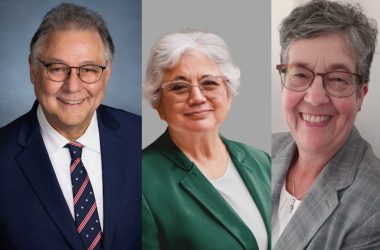 Dr. Omer Khan, a hospitalist at Salem Health (Courtesy/Omer Khan)
Dr. Omer Khan, a hospitalist at Salem Health (Courtesy/Omer Khan)
For Dr. Omer Khan, treating patients with serious cases of Covid hasn’t gotten any more predictable since the hospital saw its first in March.
But the Salem Health hospitalist, who cares for people admitted to the hospital but not sick enough for the intensive care unit, said he’s become more comfortable treating Covid patients because he’s learned to be prepared for anything.
“I’ve seen patients who come in and they don’t appear sick at all,” Khan said. “I come back the next day and they’re already in the ICU on a mechanical ventilator.”
Marion County last week passed a grim milestone in the pandemic – 100 county residents have now died from Covid, with 600 total deaths in Oregon to date. The county has recorded 5,223 cases of Covid to date, with a mortality rate of 1.9%.
A total of 418 county residents have been hospitalized with the virus, with Salem Hospital treating at least 350 of them. One in four have spent some time in the ICU while in the hospital, Salem Health spokesman Elijah Penner said.
County data shows those dying from Covid are concentrated in the county’s nursing homes and long-term care facilities. Nearly all are older Salem-area residents with other health conditions, according to a new county health department report from Oct. 3, which examined 98 of the deaths.
Sixty-three of the dead caught Covid during outbreaks at long-term care facilities. The next most common source of infection was sporadic, reported for 18 of the dead. That means health investigators don’t know where they got sick. Eleven were related to household spread, and two each got sick in prison or in a food processing facilities.
Half of those who have died were over 80, and the county’s youngest death was a 45-year-old man who died April 18. All had at least one other health condition like heart disease, diabetes, asthma or a history of smoking. Most of those who died from the disease reported two or three health conditions.
The county’s deaths follows patterns around the U.S., where older Americans and those with underlying health conditions have been the most likely to die from the virus. Over half of people who have died from Covid in the U.S. are 75 or older, according to the most recent numbers from the Centers for Disease Control and Prevention.
But Khan and county health officials said that data doesn’t mean younger and healthier people can disregard the risks of Covid.
First, older Salemites often contract the virus through contact with younger people. Katrina Rothenberger, the county’s public health director, said the virus typically enters nursing homes through younger employees or visitors, then spreads among vulnerable residents with often deadly results.
“It’s really a tragedy for our community to have so many people who have died,” Rothenberger said in an interview last week.
Second, both said the phrase “underlying health conditions” is often misunderstood by people who don’t realize the broad range of conditions it covers, or how common those conditions are.
A 2019 community health report found half of Marion County adults have at least one chronic disease. About 10% of adults had asthma and 6% had chronic obstructive pulmonary disease, a chronic lung condition common among smokers. Rothenberger said the phrase includes other common problems like high blood pressure or being a former smoker.
Khan said the county’s data on who’s dying from Covid mirrors his experience at Salem Hospital. He said obesity, diabetes and older age are the three factors he sees most often in people seriously ill.
Deaths from Covid are most commonly from respiratory failure, Khan said, often after a patient develops pneumonia because of the damage the virus has done to their lungs.
The virus can also cause blood clots which lead to strokes or cardiac problems in some patients, Khan said, something he’s personally observed three or four times. As a result, doctors carefully monitor patient’s blood for proteins related to clotting, cholesterol levels and more.
While those who die from Covid are usually elderly, Khan said the patients who stay in the hospital longest are younger.
The average time a Covid patient stays at Salem Hospital is about a week, Penner said.
But Khan has seen many longer stays of three to four weeks, often with middle-aged people who are obese or have asthma or diabetes. While older patients who are seriously ill may die from Covid quickly, he said younger people with serious illness stay in the hospital longer than because their bodies will keep fighting the virus.
“That person is going to take weeks and months to get back to where he was before all of this started, and that is the scary part about getting sick,” Khan said.
After seven months of caring for Covid patients, Khan said he and other doctors still can’t reliably guess who will get seriously ill because the disease is often unpredictable. Testing is more available now, so it’s common for hospital patients to get a Covid test even if they’re there for an unrelated illness.
He’s seen elderly people with multiple serious health conditions test positive for Covid but show few or no symptoms. Recently, he cared for a Covid patient in her 50s with a history of asthma who came into the hospital because she felt tired and unwell but wasn’t struggling with respiratory problems. She was receiving minimal oxygen when Khan left the hospital in the evening. The next day when he reported for work, the woman was in the ICU on a ventilator, he said.
“Who’s going to be that person? We don’t know,” he said.
What has changed, Khan said, is health care professionals have seen the basic precautions they take to prevent the spread of disease – like wearing masks and gowns around patients and washing hands regularly – work well to stop the coronavirus. Many feared becoming infected early in the pandemic, when protective equipment was in short supply and less was known about effectively stopping the spread.
Khan said he and other doctors he works with have all tested negative for coronavirus antibodies despite caring for dozens of Covid patients in close quarters.
“Our best bet is to protect ourselves,” he said.
SUPPORT ESSENTIAL REPORTING FOR SALEM – A subscription starts at $5 a month for around-the-clock access to stories and email alerts sent directly to you. Your support matters. Go HERE.
Contact reporter Rachel Alexander: [email protected] or 503-575-1241.

Rachel Alexander is Salem Reporter’s managing editor. She joined Salem Reporter when it was founded in 2018 and covers city news, education, nonprofits and a little bit of everything else. She’s been a journalist in Oregon and Washington for a decade. Outside of work, she’s a skater and board member with Salem’s Cherry City Roller Derby and can often be found with her nose buried in a book.









